|
De Zweedse dichter en schrijver Lars Gustafsson werd geboren in Västeras, op 17 mei 1936. Zie ook alle tags voor Lars Gustafsson op dit blog.
Priemgetallen
De eersten zijn
donkere vestingen
opgetrokken door vorsten
in een lang vervlogen tijd.
Ze liggen dicht opeen
en werpen lange schaduwen,
het land rondom een vlak
en zwaar verdedigd moerasgebied.
Ze zijn gebouwd van een steensoort
door geen tijd aan te tasten
en alle andere zijn dorpen
hurkend daar omheen.
Daarna worden zij steeds zeldzamer:
je moet lang over weidse vlaktes rijden
om er nog een aan de horizon te ontwaren.
De waarheid is dat zij steeds zeldzamer worden
op hun weg naar de onvoorstelbare diepten.
En dokter Riemanns schaduw tekent zich
onnatuurlijk hoog en dreigend af
tegen een oneindige zonsondergang.
Vertaald door J. Bernlef
Hamlet Prince Of Denmark
Prince Hamlet of Denmark
but now without his fatal wound
and dressed in a good suit from Savile Row
but the tie most certainly
from the rowing club at the University of Wittenberg
came out of the night’s shadows and said
You see, Professor. It is not quite so easy
to come back home
and see that everything is changed
and no one, not even Mama
understands a single word.
About what one says.
But in the event that
a little ugly dwarf
with cheeks painted red
appears just around the corner
then we are dreaming the same dream.
Paradise
The swamp, forbidden to enter
Dangerous depths with purple loosestrife and bitter clover.
The salamanders that we caught
and called ‘water lizards’.
They were supposed to cause warts on fingers
Because they themselves had warts.
Surely extinct now. Who needs them?
Suddenly the boy was twenty years old.
Ahead of him, life,
extending endlessly like the plains of Kurland.
The creeks. The salamanders.
We took it all away.
No one else.
Vertaald door Susan W. Howard
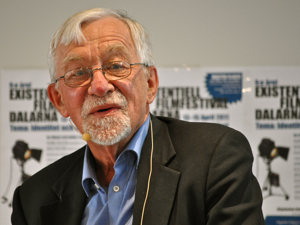
Lars Gustafsson (Västeras, 17 mei 1936)
De Deense schrijver Peter Høeg werd geboren in Kopenhagen op 17 mei 1957. Zie ook alle tags voor Peter Høeg op dit blog.
Uit: The Elephant Keepers’ Children (Vertaald door Martin Aitken)
“It’s not like we have never seen my father cry before. When you’re married to someone like my mother, who very often forgets everything around her, including her husband and her children and her dog, because she has become obsessed by the idea of making her own mechanical wristwatch and works twenty-four hours in one stretch to center the axles of the wheels while we children and our father go hungry—when you’re married to a woman like that you will have need to weep on the shoulders of close friends at least once a fortnight, which Father almost certainly has done in the company of Bent Piglet or John the Savior.
But he has never done it at home. On such occasions as we have seen Father weep, it has always been in church and on account of him saying something especially beautiful that makes him cry because he is moved and grateful for the Lord having provided Finø with such a magnificent pastor as himself. Or else he cries at a funeral in sympathy with the bereaved, and one must reluctantly admit that Father’s sympathy is almost as great as his satisfaction at putting it on display.
Though his complacency and sympathy both may be great, they have never been so great as what we now witness in the kitchen of our rectory home. What we see is something that has always been contained inside our father, but which only now is released, and to begin with we have no words for it. But Father leaves the kitchen and Mother goes after him, and Tilte and Hans and Basker and I remain behind and look at each other. We sit for a moment in silence, and then Tilte suddenly says: “They’re elephant keepers. That’s Mother’s and Father’s problem. They’re elephant keepers without knowing.”
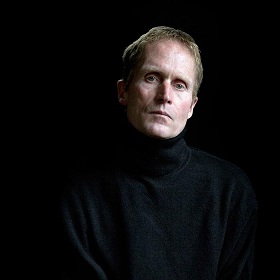
Peter Høeg (Kopenhagen, 17 mei 1957)
De Amerikaanse schrijver Gary Paulsen werd geboren op 17 mei 1939 in Minneapolis, Minnesota. Zie ook alle tags voor Gary Paulsen op dit blog.
Uit: Hatchet
“What had he read or seen that told him about food in the wilderness? Hadn't there been something? A show, yes, a show on television about air force pilots and some kind of course they took. A survival course. All right, he had the show coming into his thoughts now. The pilots had to live in the desert. They put them in the desert down in Arizona or someplace and they had to live for a week. They had to find food and water for a week.
For water they had made a sheet of plastic into a dew gathering device and for food they ate lizards. That was it. Of course Brian had lots of water and there weren't too many lizards in the Canadian woods, that he knew. One of the pilots had used a watch crystal as a magnifying glass to focus the sun and start a fire so they didn't have to eat the lizards raw. But Brian had a digital watch, without a crystal, broken at that. So the show didn't help him much.
Wait, there was one thing. One of the pilots, a woman, had found some kind of beans on a bush and she had used them with her lizard meat to make a little stew in a tin can she had found. Bean lizard stew. There weren't any beans here, but there must be berries. There had to be berry bushes around. Sure, the woods were full of berry bushes. That's what everybody always said. Well, he'd actually never heard anybody say it. But he felt that it should be true.
There must be berry bushes.“
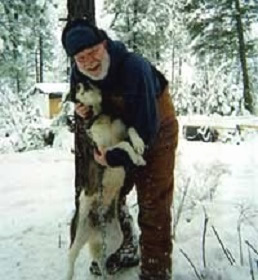
Gary Paulsen (Minneapolis, 17 mei 1939)
De Franse dichter en schrijver Henri Barbusse werd geboren op 17 mei 1873 in Asnières-sur-Seine. Zie ook alle tags voor Henri Barbusse op dit blog.
Uit: Le Feu
« Ayant suivi le boulevard de la République puis l’avenue Gambetta, nous débouchons sur la place du Commerce. Les clous de nos souliers cirés sonnent sur les pavés de la ville. Il fait beau. Le ciel ensoleillé miroite et brille comme à travers les verrières d’une serre, et fait étinceler les devantures de la place. Nos capotes bien brossées ont leurs pans abaissés et, comme ils sont relevés d’habitude, on voit se dessiner, sur ces pans flottants, deux carrés, où le drap est plus bleu.
Notre bande flâneuse s’arrête un instant, et hésite, devant le café de la Sous-Préfecture, appelé aussi le Grand-Café.
-On a le droit d’entrer! dit Volpatte.
-Il y a trop d’officiers là-dedans, repartit Blaire qui, haussant sa figure pardessus le rideau de guipure qui habille l’établissement, a risqué un coup d’oeil dans la glace, entre les lettres d’or.
-Et pis, dit Paradis, on n’a pas encore assez vu.
On se remet en marche et les simples soldats que nous sommes passent en revue les riches boutiques qui font cercle sur la place: les magasins de nouveautés, les papeteries, les pharmacies, et, tel un uniforme constellé de général, la vitrine du bijoutier. On a sorti ses sourires comme un ornement. On est exempts de tout travail jusqu’au soir, on est libres, on est propriétaires de son temps.
Les jambes font un pas doux et reposant; les mains, vides, ballantes, se promènent, elles aussi, de long en large."
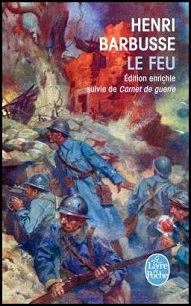
Henri Barbusse (17 mei 1873 –30 augustus 1936)
Cover
De Vlaamse dichteres en schrijfster Virginie Loveling werd geboren in Nevele op 17 mei 1836. Zie ook alle tags voor Virginie Loveling op dit blog.
De zucht naar ’t eindeloze
Als 't maantje in mijn venster schijnt,
Dan kan ik niet meer slapen;
Dan komt de vraag: Waar is die God,
Die alles heeft geschapen?
De stille nacht, het eenzaam uur,
Het suizlen door de linden;
Dan denk ik aan de dood en 't graf
En aan verloren vrinden.
Dan wordt de geest zo onrustvol,
En haakt naar 't onbekende,
Als ik in 's hemels sterrenveld
De wakende ogen wende.
Dan schijnt de wereld mij zo klein :
Mij lokt die hemelverte.
0 kon ik vliegen! doch waarheen,
Waarheen, gij kloppend herte?
Haar laatste wandeling
Zij wandelde in de zonne -
Het loof ruiste over 't pad.
Ik ben het afgevallen,
Het vroeg verwelkte blad.
De zwaal'wen trekken henen,
Ik staar hen na en peis:
Ik ben een arme zwaluw,
Ik moet alleen op reis.
Zij trekken naar het zuiden,
Zij weten waar zij gaan,
Zij zullen wederkeren
Met loof en lenteblaân.
Het woud zal weer herleven
In warme zonneschijn,
De nachtegaal zal zingen -
En ik, waar zal ik zijn?...
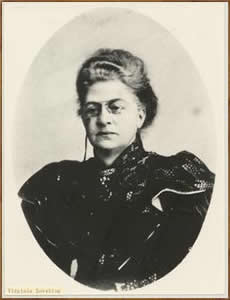
Virginie Loveling (17 mei 1836 – 1 december 1923)
Onafhankelijk van geboortedata:
De Nederlandse dichter Mischa Andriessen werd geboren in Apeldoorn in 1970. Zie ook alle tags voor Mischa Andriessen op dit blog.
Wallenberg
Jullie stonden al klaar,
jassen aan, elkaar los
gelaten, twee dingen maar
mochten mee; je broer
een pot jam en een beer,
jij een beer en een boek.
Dadelijk zou het anders zijn,
het nieuwe huis een haven.
Ze zouden jullie komen halen,
niet schreeuwen; ze kwamen,
schreeuwden: ’opschieten,
opschieten nou.’ Hun gezichten
grauw als vuilgelopen sneeuw.
Je omklemde de laadklep
met beide handen, je broer de jam.
Jullie keken de verte van de straat in
waarin alles wat jullie kenden verdween.
Je broer huilde. ‘Niet bang zijn,’
huilde je, ‘Ik ben niet bang.’
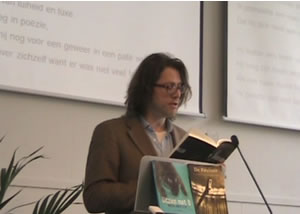
Mischa Andriessen (Apeldoorn, 1970)
Zie voor nog meer schrijvers van de 17e mei ook mijn vorige blog van vandaag.
|



